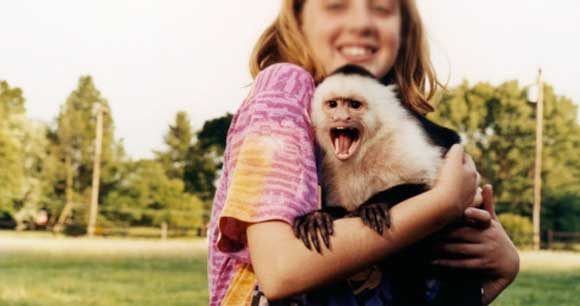
Washington, DC—The Animal Welfare Institute (AWI) applauds yesterday’s reintroduction of the Captive Primate Safety Act (CPSA), which would end the cruel and dangerous pet primate trade in the United States. Nonhuman primates, including chimpanzees, capuchins, and lemurs, suffer enormously when kept as pets. They can also injure or spread disease to the people around them.
Sponsored by Reps. Mike Quigley (D-IL), Brian Fitzpatrick (R-PA), Julia Brownley (D-CA), and Nancy Mace (R-SC), and Sen. Richard Blumenthal (D-CT), this bill would ban the private possession of nonhuman primates. The prohibition is narrowly focused on pet primates and exempts zoos, research labs, sanctuaries, and universities. Current owners would be grandfathered in and simply be required to register their animals.
“Primates are wild animals, not pets or playthings” said Susan Millward, AWI’s CEO and executive director. “Primates have natural instincts that can make them aggressive and unpredictable toward humans, and nobody wins when they’re kept inside a home. These animals suffer permanent physical and mental trauma when they are mutilated, isolated, caged, and malnourished. The Captive Primate Safety Act would protect primates from a lifetime of cruelty.”
“Chimp Crazy,” the four-part docuseries that premiered last year on HBO Max, highlighted some of the heart-wrenching stories of chimpanzees caught up in the pet trade. Even the most well-meaning owner cannot provide the special care, housing, diet, socialization, and maintenance that these animals require. Many captive primates spend their entire lives in relative isolation, compared to living in the wild in large social groups. They experience physical and psychological suffering when confronted with unrealistic expectations that they will behave like perfectly trained pets or even “little humans.”
Breeders generally sell primates as cute infants on the internet or through out-of-state dealers and auctions without disclosing that these baby animals have been forcibly removed from their mothers, often at only a few days old. As these animals reach sexual maturity, they become larger and more aggressive. They pose a serious threat to the people around them, as evidenced by the hundreds of reported injuries nationwide over the last few decades. Captive primates have mauled neighbors, turned on their owners, and endangered local police officers and emergency personnel, who must expend countless hours and resources responding to escapes, attacks, and cruelty cases.
Primates pose a significant threat to public health because they can carry life-threatening diseases that are communicable to humans, including Ebola, tuberculosis, and the Herpes B virus.
The pet primate trade also contributes to the illegal international wildlife trade. Demand for primates in the United States can incentivize the capture and trafficking of animals from the wild—many of them threatened or endangered species. Primates are smuggled into the United States to meet the demand, with trafficked animals suffering immensely and often dying along the way. While some primates are detected and confiscated at the border, there is no way to know how many more slip through and are sold as pets.
“Monkeys and apes belong in the wild—not in living rooms. This bill will ban private possession of these animals, ensuring that we are safe and primates are able to live freely,” said Quigley, co-chair of the Congressional Animal Protection Caucus. “As the lead sponsor of the 2022 Big Cat Public Safety Act, I’m proud to sponsor the Captive Primate Safety Act to advance the same protections for primates.”
Marjorie Fishman, Animal Welfare Institute
[email protected], (202) 446-2128
The Animal Welfare Institute (awionline.org) is a nonprofit charitable organization founded in 1951 and dedicated to alleviating animal suffering caused by people. We seek to improve the welfare of animals everywhere: in agriculture, in commerce, in our homes and communities, in research, and in the wild. Follow us on Facebook, Instagram, Threads, Bluesky, and LinkedIn for updates and other important animal protection news.